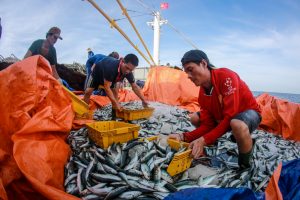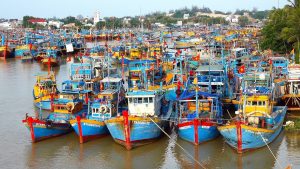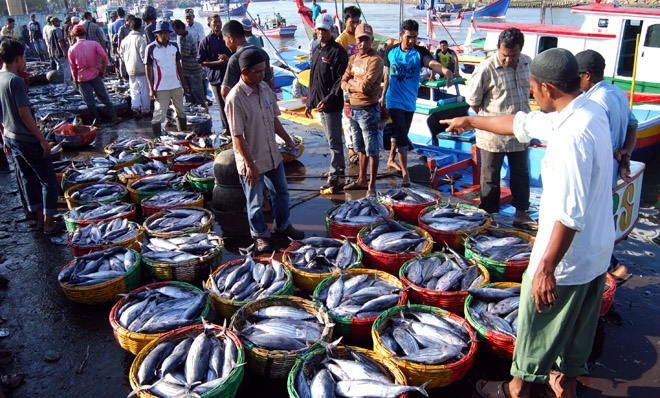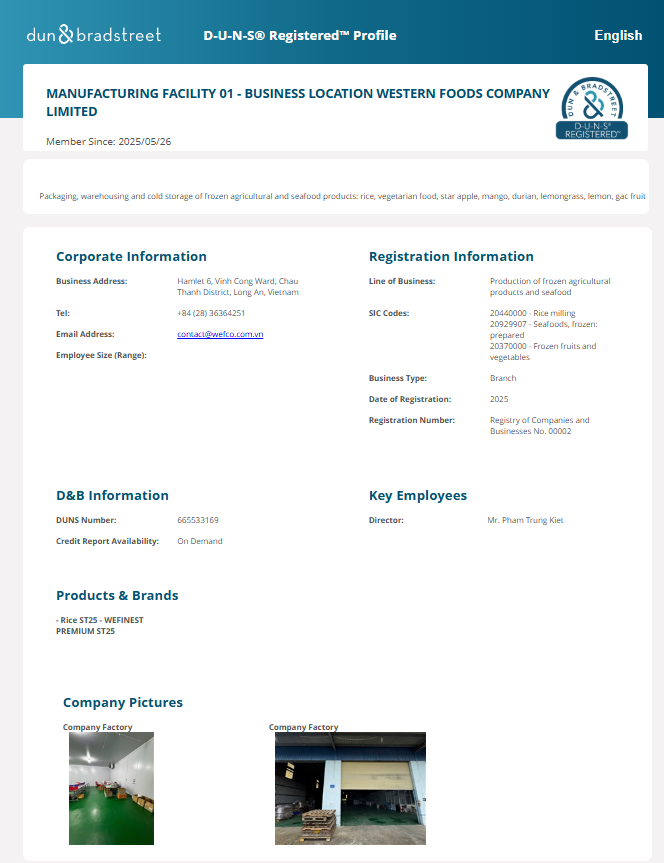Seafood businesses are facing many difficulties and inadequacies – especially related to raw material certificates (S/C) in the provinces, leading to the inability to obtain the necessary documents for exporting seafood shipments to Europe. This is also a situation that significantly limits the consumption of raw materials for fishermen, as well as significantly reduces the flow of goods to the EU.
On August 14, 2024, the Vietnam Association of Seafood Exporters and Processors (VASEP) sent an official letter to the Ministry of Agriculture and Rural Development on reporting on a number of inadequacies in the implementation of IUU control and issuance of S/C certificates and proposing support, consideration for improvement and removal.
VASEP said that the Association and the business community are always proactive and strive to accompany the Government and the Ministry of Agriculture and Rural Development in complying well with control regulations related to combating IUU fishing and sustainable development of the seafood industry. The Association also shared with the Ministry about the huge workload and many factors required for many years.
In the process of cooperating with the subjects of the seafood production and export chain to obtain full documents and authentication documents for each shipment, the seafood business community has also encountered many difficulties and inadequacies – especially related to the certificate of raw materials (S/C) in the provinces, etc leading to enterprises not being able to obtain the necessary documents for exporting seafood shipments to Europe. And this is also the situation that significantly limits the consumption of raw materials for fishermen, as well as significantly reduces the flow of goods to the EU.

Many operating vessels do not make a commitment to meet food safety conditions (according to Circular 17/2018/TT-BNNPTNT), so in the end, enterprises cannot be issued S/C certificates to make export conditions. In this matter, HH VASEP also made a report and recommendation to the Ministry of Agriculture and Rural Development in April 2024, and the Ministry has sent a document to the provinces that manage ships, but this situation has not improved much.
Currently, the situation of fishing vessels losing connection to cruise data is still a lot. There is a reality that enterprises in many cases, despite their best efforts, still cannot grasp or check whether the purchased materials are legal or illegal. Current regulations do not allow enterprises to inspect and monitor the voyage of fishing vessels or administrative supervision data that the Fishing Port Management Board & Sub-Department is granted to use.
Therefore, enterprises are always in a passive position in controlling the origin and legality of exploited raw materials. Fishing ship owners and purchasing agents always have other consumption points that do not need S/C paper, so these entities in some places have not cooperated and supported enterprises to obtain enough information and documents for making S/C paper when buying raw materials for EU export processing. Many cases of “bad crying, bad laughter” affect the procedures for applying for S/C of enterprises after enterprises have purchased raw materials.

In order to remove inadequacies and obstacles according to actual conditions in localities in seafood management and exploitation, procedures for issuing S/C and opening up for seafood production and export, the Association would like to have a number of proposals to propose the Ministry of Agriculture and Rural Development and the People’s Committees of coastal provinces to consider having a program (investment, renovation) to increase the number of “standard” fishing ports designated and announced – contributing to basically relieving the current bottleneck in the management of fishing vessels docking and confirming raw materials. There is more investment in infrastructure, transport connecting ports and equipment for the designated/announced fishing ports commensurate with the actual situation.
Along with that, the website of the Department of Fisheries updates the list of IUU violating ships, but then when removing a ship from the list, it is proposed that there should also be a detailed notice (withdrawal time, reason) to help enterprises make and update the purchase and also establish other bases related to related shipments; Consider supplementing and amending in accordance with the contents stated in the exploitation license – so that both main and secondary occupations can be sufficient.
Consider supporting regulations or measures and guidelines for provinces (Sub-Departments, Fishing Ports, etc.) so that enterprises, when buying fishing materials from fishermen, can know in advance whether those materials are legal or illegal as a basis for “making S/C papers, C/C and can be exported to the EU” – because in addition to the “IUU” ship information on the website of the Department of Fisheries, enterprises do not have the right to check the voyage monitoring data (GSHT) – this data is only accessed by the Fishing Port Management Board & Fisheries Sub-Department.
Continue to direct, guide and promote the provinces to well implement the regulations of the Ministry of Agriculture and Rural Development in 2 Circulars 17/2028, 38/2018 on “Certification of food safety conditions” and “Commitment to meet food safety conditions” for fishing vessels.
For an effective traceability software (eCDT) system
From July 1, 2024, an electronic fishing traceability system will be deployed for 100% of fishing vessels entering and exiting the port, including the collection and submission of fishing logs and monitoring of loading and unloading output through the eCDT system. Currently, fishing ports are requiring fishermen when entering the port to declare production information on the mobile app, fishing ports do not accept paper declarations.
However, VASEP said that many vessels are currently exploiting when entering the port to sell raw materials to enterprises, but fishermen refuse to enter the phone app to declare output information to the fishing port management board for approval to click to sell raw materials to enterprises. In July 2024, many fishing ports will not issue seafood loading and unloading receipts and SC papers for exploited aquatic materials.
In order for the traceability software system (eCDT) to be effective and helpful for both management agencies and enterprises, the Association proposes to consider adding 02 entities that are procurement and barn vessels to this eCDT software.
The Department of Fisheries trains and guides fishermen in loading input data accurately so that the following stages are not encumbered. It is necessary to set up a 24/7 technical support line. In the early stage when eCDT is newly applied, it is recommended to establish a support team at fishing ports to answer questions and support ship owners in the process of using the system and updating information. At the same time, there are instructions on data entry to the eCDT for small fishing vessels (less than 15m) that do not install VMS.
It is required that all stages of inspection of IUU vessels must be completed before the ship enters the port. When the enterprise confirms the purchase of raw materials from ship A on the software and switches to apply for S/C, the fishing port management board will always confirm the S/C.
Source: thuongtruong.com





